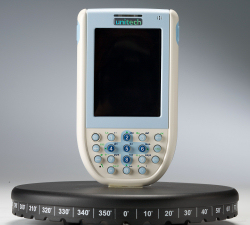| INFORMATION: Free information is available from Unitech on the subject in this story. Click here to request a copy |
 The healthcare sector increasingly has to deal with demands for greater efficiency. Encouragingly, electronic patient record systems are being implemented in healthcare systems across the world, making all medical information related to a particular patient available, wherever he or she is located.
The healthcare sector increasingly has to deal with demands for greater efficiency. Encouragingly, electronic patient record systems are being implemented in healthcare systems across the world, making all medical information related to a particular patient available, wherever he or she is located.
Electronic data not only speeds up the communication process, it also reduces the number of errors, can help increase the accuracy of medical diagnoses and generally improves the overall quality of healthcare.
The needs for today and tomorrow
It has now become almost impossible to imagine the medical environment without RFID. This technology facilitates the easy identification of patients, staff and medical equipment without visual contact. The number of objects fitted with an RFID tag is growing each day and the authenticity of a tag insures that forgery is impossible. Identification wristbands used to be no more than a number and some information. Today, hospital staff can not only correctly identify patients by reading their RFID-enabled wrist band, they can also ensure that the correct treatment is administered to the correct patient when scanning medicines.
Implementing RFID solutions will help ensure that the five rights of medication safety are achieved: right patient, right drug, right dose, right route and right time. They also comply with the standards and regulations of top healthcare regulatory groups for tamperproof, non-transferable, positive patient ID. It is obvious that the use of RFID has dramatically reduced the number of medication errors already and thus saved lives. Moreover, the use of RFID tags and systems in healthcare is expected to rise rapidly from US$90 million in 2006 to US$2.1 billion in 2016.
Equipping a PDA with an RFID reader implies that other features are also indispensable. A full QVGA touch screen enables applicants to view more information about the RFID tags that have been read and to enter data by means of an alphanumeric keypad. This way hospital staff can consult a patients entire medical record at his or her bedside. In addition, staff can have direct access to information related to the planning of further treatment and investigations. This adds up to considerable time savings.
Healthcare look PDA
Unitech understands the importance of using the right technology, since this can reduce the number of vital mistakes during treatments. Unitechs PA600 Healthcare PDA is especially targeted for healthcare applications. The rugged mobile computer has an integrated HF RFID with 2D barcode reader and due to the Oracle Database Lite and Microsoft Biz Talk Server 2006 support, the RFID data can easily be synchronised with existing systems and databases. In addition, the PA600 Healthcare PDA features a healthcare look, in white and light blue colours. Its case is constructed from anti-microbial protection material and weighs only 315 grams. The PA600 Healthcare PDA is Unitechs support to improve the efficiency and reliability in the health care sector.
Unitech at a glance
Unitech is a world-class manufacturer of rugged data capture, mobile computing and PDA products, focusing on automatic data collection products and services to improve productivity, efficiency and quality of operations. Unitech produces a full range of AIDC products including portable data collection terminals, handheld scanners, magnetic stripe readers and fixed terminals. Its products have brought value to customers all over the world, from retail to banking and from warehousing to manufacturing.

Add a Comment
No messages on this article yet